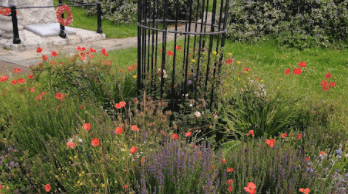
Flower beds across the district have been transformed as part of Thanet District Council’s Climate and Biodiversity Emergency Declaration.
The scheme was launched to create a new and more effective approach to planting in council-maintained flower beds.
The aim is to move away from more traditional planting of ‘annuals’ and replace them with perennial plants.
Perennials live for a number of years and regrow every spring, while annual plants live for only one growing season, then die off, meaning that they need to be replaced each year.
New plants were chosen to provide a variety of foliage, texture, flowering periods, colour and fragrance and planting started earlier this year.
The council says improving biodiversity was also an important consideration and the new planting will help to create habitats for pollinators and other insects, enhance soil life, and importantly, increase the visual appeal and beauty of the beds for the residents and visitors who enjoy them.

The council’s Biodiversity and Horticulture Officer carefully considered the plants’ tolerance of coastal conditions and exposure to salt, as many of the beds across the district are in exposed locations.
The team has planted hardy annuals among the new perennial planting, to fill the gaps until the perennials become more established.
As the years progress, the beds will continue to improve, and the earth will start to be covered by the plants intermingling together.
The new perennial plants will be lifted and divided every three to four years.
As well as keeping the plants in top condition, the new approach means that the council is able to use these beds as stock beds, growing its own plants which will be divided and transplanted to other locations, reducing the long term cost of planting and helping to drive sustainability.
Beds have been transformed at Westgate seafront, Westgate War Memorial, the Buenos Ayres beds near Margate Station, Trinity Park, Gina Malick Memorial Garden, Cliftonville Oval, Broadstairs seafront promenade and Hopeville Avenue, St Peters.
Residents are helping to ensure the beds thrive and become established by watering them when the weather is dry, as well as by ‘edging’ the beds to stop couch grass and field bindweed taking hold.
Councillor George Kup, cabinet member for community safety and youth engagement, said: “The flower beds provide great interest throughout the district, and it’s great to see the wide variety of planting, benefiting local residents, visitors and most importantly the environment.
“I hope that the project can be extended to additional areas in Thanet over the next few years.
“It has been particularly heartening to see the successful collaboration between residents and council teams in Westgate-on-Sea and at the Cliftonville Oval.”
The initiative was led by the council’s Open Spaces team, and forms part of the response to the Biodiversity and Climate Emergency, announced in 2019.
The council is working with a range of local groups across the district, and plans to create further areas of more sustainable planting, though key to this is the availability of locally produced compost.
If you would like to take part in the project, contact the council’s Open Spaces team at [email protected].

